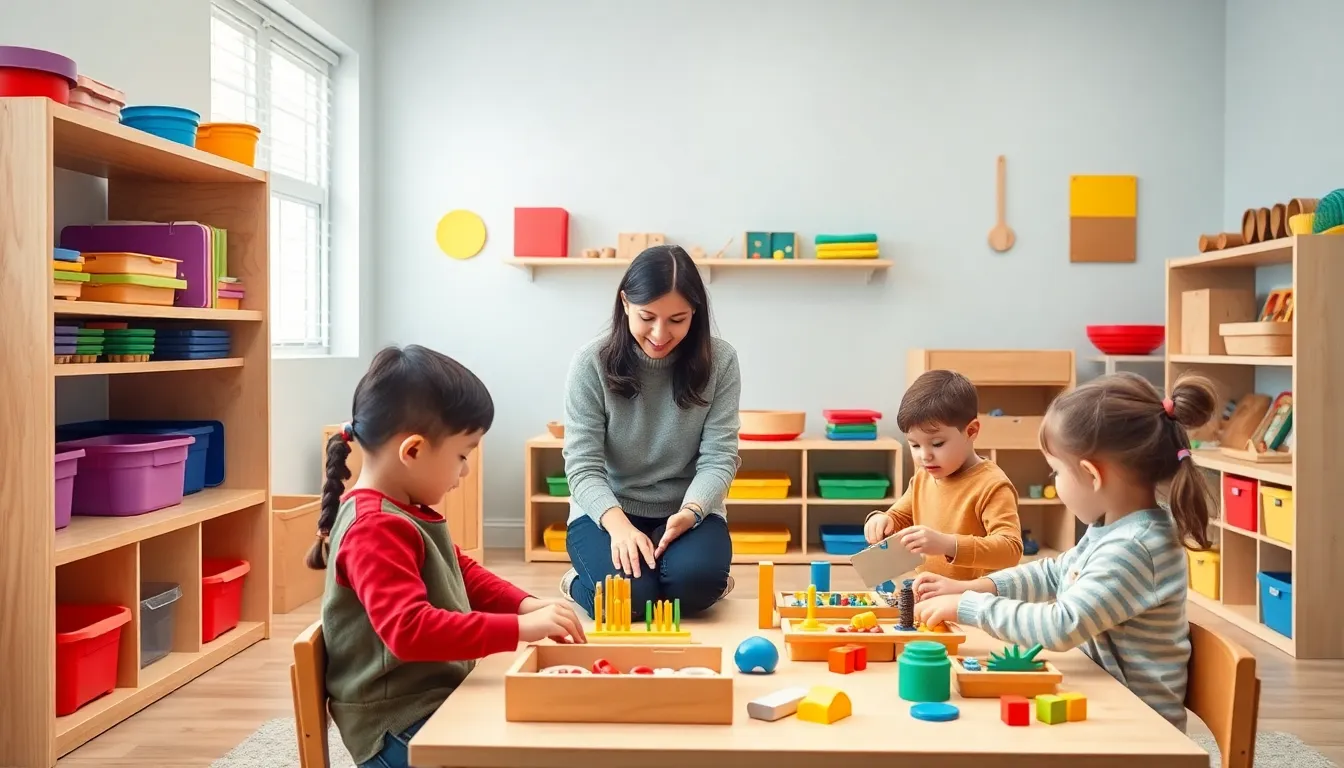Montessori philosophy revolutionizes education by focusing on the individual needs of each child. Developed by Dr. Maria Montessori over a century ago, this approach emphasizes hands-on learning and self-directed activity. It nurtures a child’s natural curiosity, allowing them to explore and discover at their own pace.
In a Montessori environment, children engage with specially designed materials that promote critical thinking and problem-solving skills. Teachers act as guides rather than traditional instructors, fostering independence and confidence. As more parents and educators recognize the benefits of this method, Montessori schools are gaining popularity worldwide, shaping the future of education for generations to come.
Table of Contents
ToggleOverview of Montessori Philosophy
Montessori philosophy emphasizes a child-centered approach to education. Developed by Dr. Maria Montessori, this method supports individualized learning and respects each child’s unique development pace. Key principles include:
- Prepared Environment: Learning spaces are designed to foster independence and exploration. Materials are tailored to promote cognitive, social, and emotional growth.
- Hands-On Learning: Children engage with tactile materials. This approach enhances understanding through sensory experiences that stimulate curiosity and critical thinking.
- Self-Directed Activity: Students choose activities based on interests and developmental readiness. This autonomy cultivates intrinsic motivation, encouraging a lifelong love of learning.
- Role of the Educator: Teachers act as guides rather than traditional instructors. They observe children’s progress, provide support, and foster a respectful, collaborative atmosphere.
Montessori environments cultivate skills beyond academics, nurturing social abilities and emotional intelligence. The growing popularity of Montessori education reflects its effectiveness in preparing children for future challenges.
Core Principles of Montessori Philosophy

Montessori philosophy centers on several core principles that guide its approach to education. These principles encourage a supportive, enriching environment that caters to each child’s unique learning journey.
Respect for the Child
Respect for the child forms a foundational aspect of Montessori education. Adults view children as capable individuals with their own thoughts and feelings. This respect fosters independence, allowing children to explore, make choices, and take responsibility for their learning. Empowering children to express their interests promotes confidence and self-esteem, crucial elements for their overall development.
The Prepared Environment
The prepared environment plays a significant role in Montessori philosophy, designed to be inviting, organized, and accessible. This space includes a variety of materials tailored to different age groups and developmental stages. The arrangement of tools and resources encourages exploration and learning. Children can freely engage with the materials at their own pace, fostering inquiry and helping them grasp complex concepts through hands-on experiences.
The Role of the Educator
The role of the educator in Montessori settings differs from traditional approaches. Educators act as guides rather than authoritative figures, facilitating learning by observing and responding to children’s needs. They provide support and resources without imposing their agenda, allowing children to take center stage in their educational journey. This approach nurtures a collaborative atmosphere, where children feel safe to explore, ask questions, and develop their problem-solving skills.
Montessori Philosophy in Practice
Montessori philosophy manifests through structured classroom environments and specific learning activities that support children’s natural development. Practical application of this approach fosters independence, creativity, and a lifelong passion for learning.
Classroom Structure and Activities
Montessori classrooms feature distinct areas designed for various types of learning, including practical life skills, sensory exploration, language, mathematics, and cultural studies. Classroom layouts encourage movement and interaction among students. Each area contains developmentally appropriate materials that invite exploration and experimentation.
- Materials are hands-on and self-correcting, helping children understand concepts through tangible experiences.
- Learning areas promote choice and autonomy, allowing children to select activities that align with their interests.
- Group activities encourage collaboration, enhancing social skills and teamwork among peers.
- Individual work nurtures focus, allowing children to engage deeply with materials at their own pace.
Child-Centered Learning
Child-centered learning represents the core of Montessori philosophy, emphasizing respect for each child’s unique abilities and interests. This approach empowers children to take ownership of their education through self-directed exploration.
- Autonomy fosters confidence, enabling children to make choices in their learning journey.
- Interest-led activities promote engagement, ensuring that lessons resonate with children’s curiosity.
- Guided observation allows teachers to facilitate rather than direct, supporting children’s natural motivations.
- Adaptable lessons meet individual needs, ensuring that all children progress according to their developmental stages.
Together, these elements create a dynamic learning environment that develops problem-solving skills, critical thinking, and emotional intelligence, essential for children’s growth in today’s world.
Benefits of Montessori Philosophy
Montessori philosophy offers significant benefits that contribute to a child’s overall development. This approach enhances cognitive abilities, promotes social interactions, and fosters emotional intelligence.
Cognitive Development
Montessori education strengthens critical thinking and problem-solving skills. Children engage with hands-on materials that promote exploration and inquiry. Materials are designed to be self-correcting, allowing learners to discover solutions independently. This method encourages deep understanding rather than rote memorization, as children manipulate concrete objects to grasp abstract concepts. Research indicates that students in Montessori programs often excel academically compared to their peers in traditional settings, showing stronger performance in standardized assessments.
Social and Emotional Growth
Montessori environments support the development of social skills and emotional intelligence. Children work in mixed-age groups, fostering collaboration and peer learning. This setting promotes empathy and respect as children share materials and ideas, resolving conflicts cooperatively. Additionally, the emphasis on autonomy builds confidence and self-esteem, empowering children to express their feelings and thoughts. Studies reveal that Montessori students demonstrate better emotional regulation and stronger interpersonal skills, equipping them for future social interactions in both academic and community settings.
Critiques of Montessori Philosophy
Despite its growing popularity, several critiques of the Montessori philosophy exist, addressing various misconceptions and challenges in its implementation.
Common Misconceptions
Critics argue that Montessori education lacks structure. They believe child-led learning can result in chaotic environments without clear guidelines. Others worry that removing traditional grading systems can lead to unequal assessments of student progress. Some parents may also perceive Montessori methods as less rigorous compared to conventional education styles. Additionally, there’s a misconception that Montessori education is only suitable for younger children, while research indicates its adaptability across age groups.
Challenges in Implementation
Implementing Montessori philosophy in schools faces several challenges. Teacher training for Montessori methods can be extensive and costly, contributing to limited availability of qualified instructors. Schools attempting to adopt Montessori principles often struggle with meeting their curriculum standards while maintaining the child-centered approach. Balancing the prepared environment with state requirements requires careful planning and flexibility. Furthermore, integrating Montessori methods into established educational systems can encounter resistance from educators accustomed to traditional practices.
The Montessori philosophy presents a transformative approach to education that prioritizes the child’s innate curiosity and individuality. By fostering independence and encouraging hands-on learning, it equips children with essential skills for the future. The emphasis on respect and collaboration not only nurtures cognitive development but also enhances social and emotional intelligence.
As more educators and parents recognize the benefits of this method, the Montessori approach continues to gain traction around the world. While challenges exist in its implementation, the potential for creating dynamic and engaging learning environments remains significant. Ultimately, Montessori education stands as a powerful alternative that prepares children to thrive in an ever-changing world.




